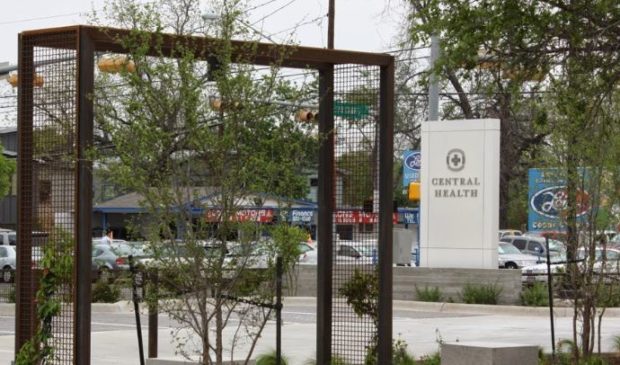Central Health considers how to raise awareness of its existence
Thursday, May 2, 2019 by
Jack Craver With limited funds and the threat of revenue restrictions from the state, Central Health, Travis County’s public hospital district, is grappling with how to make the best use of its resources.
At a town hall forum Monday at its headquarters on East Cesar Chavez Street, Central Health leaders described their organization as providing a tremendous impact for a relatively small amount of money.
The district’s budget for the current fiscal year is $258.4 million. It is funded mostly through property taxes, and currently accounts for 4.3 percent of local property tax revenue. Its tax rate of 10.7 cents per $100 of property valuation is much lower than that of other major urban hospital districts in the state. Similar systems in Dallas and San Antonio cost taxpayers nearly three times as much.
A key distinction, explained CEO Mike Geeslin, is that other districts tend to own their hospitals. Central Health partners with a wide variety of health care providers, including the major area hospitals. Those partnerships save taxpayers big-time, said Geeslin.
The forum was also an opportunity for leaders to ask community members how they believe the organization could best fulfill its mission to provide health care to low-income and uninsured residents.
The small group of 18 that showed up to the event was asked whether they believed building more brick-and-mortar clinics should remain a top priority for the organization, compared to expanding care access via new methods, such as telemedicine. Nearly everybody said the latter should be a top priority, while opinions were mixed on the importance of new clinics.
“The fluidity of our community and the fluidity of the people we serve … we have to think about those individual needs and kind of tailor it to fit,” said Charles Moody, a local pastor, explaining his support for focusing on new health care delivery methods.
Frank Rodriguez, who has worked in local health care advocacy in a variety of roles, including for Mayor Steve Adler and as a member of the Central Health Board of Directors, said that clinics provide an important “cultural presence” in communities, but that the organization, in anticipation of shifts in where the low-income population lives, should try to be flexible, including by leasing rather than owning space for clinics.
However, Rodriguez added, as low-income people are increasingly pushed to the edges of the city where public transit is sparse, it may become more important for Central Health to provide transportation to its services.
Several audience members complained that the organization was not doing enough to understand the concerns of certain segments of the population, such as African Americans and non-English speakers.
Howard Falkenberg, a veteran of public relations, said the agency should seek to raise awareness of its work among the broader public, so they appreciate what their tax dollars are supporting. He suggested sending a mailer to every county resident once or twice a year. “It can have an impact if it’s well-prepared,” he said.
The day after the meeting, the Texas House of Representatives approved a property tax bill exempting hospital districts such as Central Health and community college districts from the revenue caps that were imposed on other taxing entities such as cities, counties and school districts.
Under the House bill, Central Health will still be allowed to increase the effective tax rate by a maximum of 8 percent each year, compared to the 3.5 percent proposed for most other entities and 2.5 percent proposed for school districts.
However, the tax bill approved by the Senate would subject hospital districts to the 3.5 percent limit. It is now up to the two chambers to negotiate a compromise that will be supported by Gov. Greg Abbott.
In an interview with the Austin Monitor after the Monday meeting, Geeslin said he was closely monitoring the legislative debate and was thankful for the support from Travis County lawmakers.
“They have worked very hard on legislation to make sure that we’re exempt or have some flexibility under these caps,” he said.
The Austin Monitor’s work is made possible by donations from the community. Though our reporting covers donors from time to time, we are careful to keep business and editorial efforts separate while maintaining transparency. A complete list of donors is available here, and our code of ethics is explained here.
You're a community leader
And we’re honored you look to us for serious, in-depth news. You know a strong community needs local and dedicated watchdog reporting. We’re here for you and that won’t change. Now will you take the powerful next step and support our nonprofit news organization?




